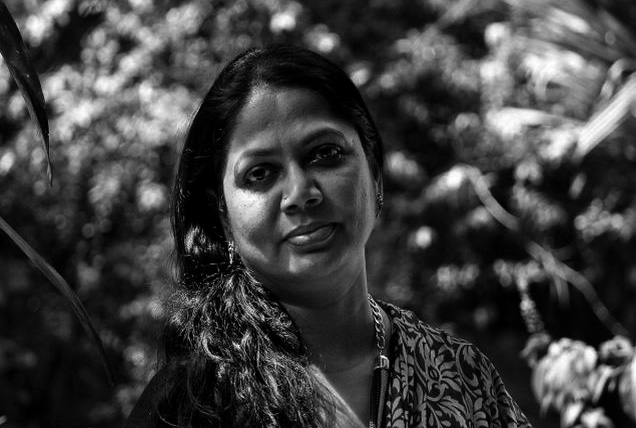
Image courtesy of The Hindu
Rajathi Salma (1982 —) is one of Tamil’s most important contemporary poets. Overcoming orthodoxy, marital violence and imprisonment in her own home, Salma has become an international literary figure and spokesperson for women’s rights. Her work articulates the nuances of repressed desire and sexuality, as well as bringing life to the often invisible domestic space inhabited by many Indian women. With two volumes of poetry, one novel and a collection of short stories, Salma has made her mark as a distinctive Indian literary voice. The late Lakshmi Holmstrom’s English translation of her novel The Hour Past Midnight was shortlisted for the Crossword Book Prize and long-listed for the Man Asian Prize. As well as being a woman of letters, Salma is a committed public servant and activist, running an organization for the promotion of women’s rights and education in rural India. She is the subject of a multi-award winning documentary film, Salma, by British filmmaker Kim Longinotto, and is currently working on a new novel, Toilet, dealing with sanitation issues faced by rural women.
Translator’s note:
Salma’s language contains a primal boldness that she wishes the many worlds of the marginalised could possess. It is her courage of conviction and starkness of expression that make Salma one of the most influential Indian writers of our time. Her story has inspired women across the world, encouraging her sisters – modern-day Tamil women – to explore a new place of freedom and creative articulation.
As we see in the poem Perspective, Salma’s idiom often breaks with convention, offering a fresh view of everyday things and thus empowering the subject with a multi-dynamic awareness of herself as a presence rather than an absence. Profoundly influenced by the bleak circumstances of her early life, Evil and Tonight present us with the terror and tedium that often limit the possibility of beauty in romantic and sexual relationships. Salma’s poetic voice reveals several hidden worlds of violence and exploitation, beckoning the reader to partake in her dream of creating a world of equality and a future of joy.
Perspective I stand upside down and comb my hair. I cook topsy-turvy, and eat thus, too. I squat inverted to feed my child; heels upward, I read my books. Upside down, I gaze at myself. Terrified, stunned, and staring at me, a bat, hanging ripe on the tree in the garden.
கோணம் -- நான் தலைகீழாகத் தலைவாரிக் கொண்டிருப்பதை தலைகீழாக சமைப்பதை தலைகீழாக உணவருந்துவதை தலைகீழாக அமர்ந்து குழைந்தைக்குப் பாலூட்டுவதை தலைக்கீழாக ப் புத்தகம் வாசிப்பதை தலைகீழாகவே நின்று தன்னை உற்றுப்பார்ப்பதை அச்சத்துடன் வியந்து பார்த்தபடியிருக்கிறது தோட்டத்து விருட்சத்தில் காய்த்துக்கிடக்கும் வௌவால்













